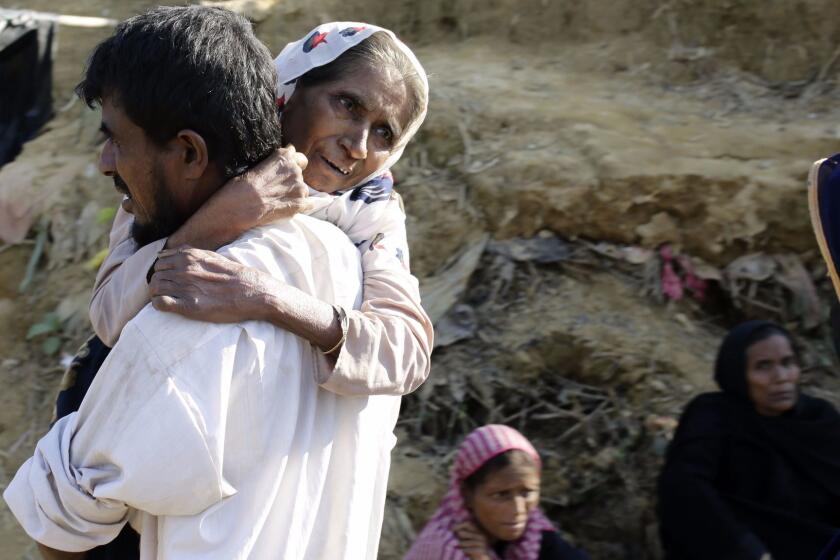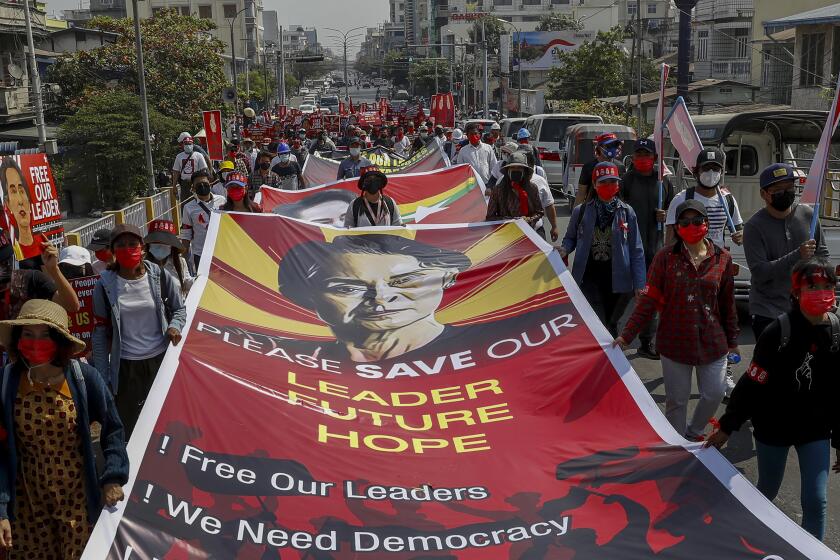Editorial: Of course it’s genocide. Finally the U.S. recognizes the truth about Myanmar’s Rohingya slaughter
- Share via
A Rohingya mother watches as her 12-year-old son is forced to lie facedown and soldiers stomp on his head and neck. In the village of Maung Nu in Myanmar, soldiers blocked people trying to escape before the military began its attack. Soldiers sank boats full of Rohingya men, women and children as they tried to flee to Bangladesh. In brutal campaigns conducted against the Rohingya Muslim population in Myanmar in 2016 and 2017, villages were burned, people were tortured and killed, women and children were raped.
“The attack against Rohingya was widespread and systematic,” U.S. Secretary of State Antony J. Blinken said Monday at the U.S. Holocaust Memorial Museum in Washington. He laid out the devastating details that were part of the fact-finding and analysis the State Department conducted before concluding officially that members of the Myanmar military are responsible for genocide against the Rohingya population, one of the most oppressed ethnic groups in the world.
As the humanitarian crisis in Myanmar grows more grim, it shows every sign of taking its place on the shameful list of mass atrocities that the world did nothing to stop.
The military’s attacks in 2016 forced nearly 100,000 Rohingya to flee to Bangladesh. In 2017, attacks killed more than 9,000 Rohingya, and forced more than 740,000 to seek refuge in Bangladesh, according to Blinken. And, as he pointed out, crimes against the Rohingya continue. The Rohingya are treated like undocumented immigrants even when they have been born and lived in Myanmar for decades or come from families who have been there a century or more. They are treated like second-class citizens — and have been the target of brutal violence for years. Blinken compared the 1982 law that effectively excluded the Rohingya from citizenship and denied them full political rights to “the 1935 Nuremberg Laws that stripped Jews of their German citizenship.”
Blinken noted that the Myanmar military for decades has also committed killings, rape and other atrocities against members of other ethnic and religious minority groups. Many of the military leaders who oversaw the genocidal campaign against Rohingya, including the general who led it, are the same military leaders who overthrew Myanmar’s democratically elected government a little more than a year ago. Since then, more than 1,600 people in Myanmar, also known as Burma, have been killed, thousands have been detained, and the de facto civilian leader of the country, Aung San Suu Kyi, has been convicted of trumped-up charges and is being detained.
The official finding of genocide in Myanmar has been long-awaited by human rights advocates and others — and is welcome. But it’s unclear what difference it will make — unless the U.S. is willing to be more aggressive. So far, little has stopped the brutal military autocrats running the government. Dozens of military leaders and their families are already under U.S. economic sanctions. And 26 companies that were implicated in human rights abuses or generate revenue for the military are under sanctions or export controls. The U.S. has also helped block Myanmar officials’ access to its overseas reserves.
These actions were appropriate but not enough. The U.S. should do more to stop the Myanmar military from obtaining weapons by pressing the United Nations Security Council to impose an embargo on arms sales. That may fail — China and Russia could veto it. If that happens, the council should vote again and put China in the awkward position of having to justify its no vote.
It’s outrageous that the military in power in Myanmar has now sentenced Suu Kyi to prison on absurd charges.
Some American and French oil companies doing business in Myanmar are on the verge of leaving. Those that leave should make sure their shares of existing exploration or development projects are put into trusts for the Myanmar people. And the U.S. should block payments made to the Myanmar Oil and Gas Enterprise in American dollars.
Much like with the war in Ukraine, there are few international supporters of the military junta takeover in Myanmar. But also, as in the crisis in Ukraine, the only way to combat bad actors like the Myanmar military is to ceaselessly chip away at their monetary and military support. Now that the U.S. has officially recognized the truth about the genocide of the Rohingya people, it should marshal all its moral might to make this happen.
More to Read
A cure for the common opinion
Get thought-provoking perspectives with our weekly newsletter.
You may occasionally receive promotional content from the Los Angeles Times.












